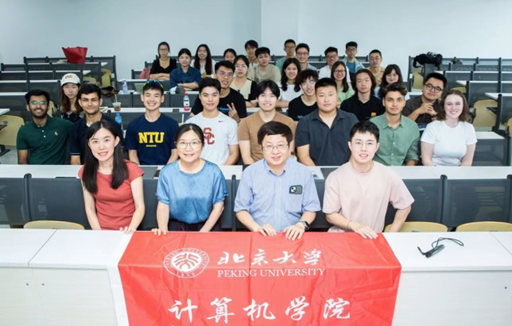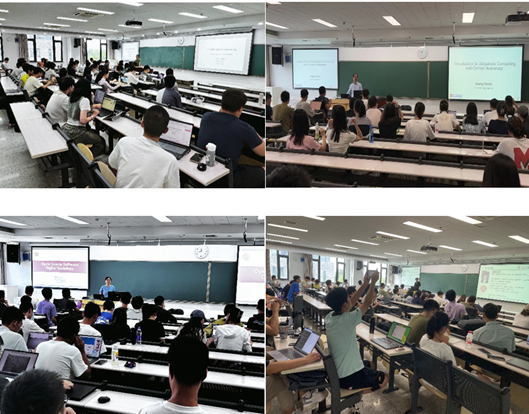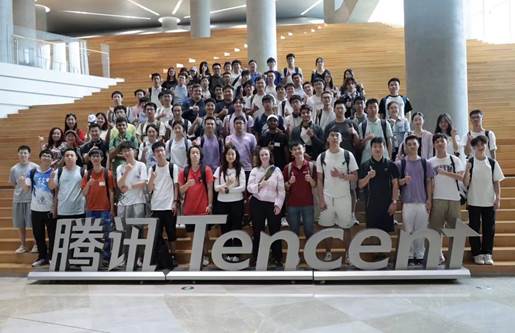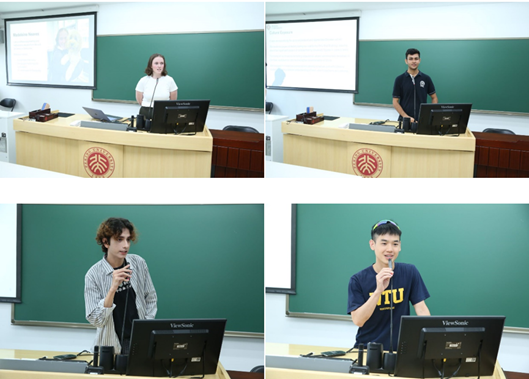International Summer School Concludes Successfully
From July 1 to July 12, 2024, the second international summer school, "Advanced Topics in Computer Science," hosted by the School of Computer Science at Peking University, concluded successfully. This summer school attracted outstanding students from all over the world with its high-quality courses, rich academic exchange activities, and exciting cultural experiences, providing a rare platform for learning and communication. 10 outstanding international students from top universities such as the University of Southern California, Columbia University, Carnegie Mellon University, Nanyang Technological University, Indian Institutes of Technology, Monash University, and Deakin University, as well as more than 20 Chinese students from various universities in China, gathered together to ignite their passion for computer science. Over the course of two weeks, students delved into various cutting-edge areas of computer science, exploring the vast ocean of knowledge.

The summer school covered a wide range of computer science topics, including Artificial Intelligence, Ubiquitous Computing, Open-Source Data Analysis, Computational Photography, Intelligent Video Transmission, Software and Hardware Co-Design and Operation, and Operating Systems, encompassing all major areas of computer science. 12 experienced professor from the School of Computer Science delivered engaging lectures, combining cutting-edge theoretical knowledge with vivid case studies. Through interactive discussions and practical exercises, students were able to integrate and apply what they had learned, continually inspiring their innovative thinking.

To allow students to experience the innovative power of technology up close, the summer school organized visits to the Beijing headquarters of two leading technology companies, Tencent and Microsoft. At Tencent, students learned about the latest internet technologies and their applications in daily life, including social media platform development and practical big data analysis. At Microsoft, they had the opportunity to engage in-depth discussions with engineers on cutting-edge topics such as artificial intelligence and cloud computing. These visits not only broadened the students' horizons but also deepened their understanding of the operational models and innovation mechanisms of tech companies.


In addition to the rich classroom teaching and company visits, the summer school also arranged engaging academic exchange activities. Benjamin from the UK and Yarroslav from Russia shared their latest research progress with fellow students, sparking intense discussions and Q&A sessions.

Furthermore, the summer school included a special visit to the historic landmark, the Red Building at Peking University. This building is not only a testament to modern Chinese history but also a significant site for cultural exchange between China and the West. Students gained a deep appreciation for China's rich historical and cultural heritage, enhancing their respect and understanding of traditional Chinese culture. During the visit, they learned about the Red Building's important role in China's revolutionary history, experiencing a poignant era of upheaval.

On the last day of the closing ceremony, students summarized their experiences over the past two weeks. Tze Kean from Nanyang Technological University remarked, "The summer school's curriculum is systematic and comprehensive, starting with basic background knowledge and progressing to advanced research. This approach enhanced my understanding and appreciation of computer systems, highlighting current theoretical and technological capabilities. Many courses focused on cutting-edge research in artificial intelligence, machine learning, and generative AI, showing how academic discoveries can be applied to practical cases, which I found immensely beneficial." Ethan Chang from Columbia University said, "The computational photography course introduced the technique of refocusing after taking a photo, which inspired me to take computational imaging next semester to deepen my understanding of computer vision. In the algorithm design and complexity theory course, I built on my previous knowledge of NP-completeness and discovered that quantum computing might redefine the concept of efficient computation, which is truly fascinating." Andy Kim from the University of Southern California stated, "In the computational photography class, the professor brought the latest camera model. I never thought I would have the chance to operate a camera worth $2,000!" Madeleine Neaves from Monash University exclaimed, "It's incredible to have the opportunity to cover almost all relevant computer science courses within two weeks, and these courses are on the cutting edge of research."
Students expressed, "We will return to our countries with new knowledge, new friends, and new perspectives to continue our studies and lives. This experience not only brought academic gains but, more importantly, established cross-cultural friendships and understanding, laying a solid foundation for our future careers."

At the end of the closing ceremony, Dean Hu Zhenjiang and Vice Dean Zhou Minghui delivered speeches. They expressed their expectations for these young students to shine in the future technology field and hoped they would return to Peking University’s School of Computer Science for further studies. Their speeches inspired every student present, igniting their dreams of pursuing technology.


Overall, the "Advanced Topics in Computer Science" summer school provided students with a unique and exciting learning platform, enabling them to explore the frontiers of computer science in a short period while laying a solid foundation for future international cooperation and exchange. The School of Computer Science will continue to strive to create more high-level academic exchange activities, offering more learning and growth opportunities to young students worldwide. We passionately look forward to seeing these talented young individuals achieve remarkable success in the field of technology and contribute to the advancement of human society.
